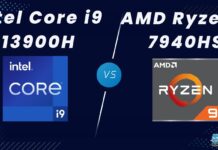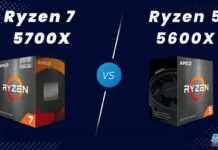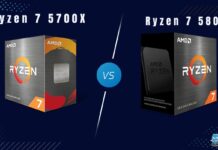In this Ryzen 5 7500F vs Ryzen 5 7600 comparison, we’ll delve into their architectural differences, explore their specifications, and put them to the test in various gaming scenarios to determine which one offers the best performance for your computing needs.
Key Takeaways
- Diving into architectural specifics, both the Ryzen 5 7500F and Ryzen 5 7600 are built on the Zen 4 foundation, showcasing AMD’s advancements in processing technology that contribute to their performance capabilities.
- With a focus on gaming prowess, the Ryzen 5 7600 takes the lead, boasting a 2.3% advantage in FPS performance over the Ryzen 5 7500F. This slight but meaningful difference can enhance the gaming experience for those seeking higher frame rates.
- Considering budget-conscious choices, the Ryzen 5 7500F stands out as the more affordable option, holding a significant 24.5% price advantage over the Ryzen 5 7600. This makes it an attractive solution for users to balance performance and cost.
- In the realm of thermal management, the Ryzen 5 7600 secures the upper hand with a 5% improvement in temperature handling compared to the Ryzen 5 7500F. This enhanced thermal efficiency contributes to the overall stability and longevity.
Comparison Table
| Feature | Ryzen 5 7500F | Ryzen 5 7600 |
| Architecture | Zen 4 | Zen 4 |
| Codename | Raphael | Raphael |
| CPU Socket | AMD Socket AM5 | AMD Socket AM5 |
| Cores | 6 | 6 |
| Threads | 12 | 12 |
| Base Clock | 3.7 GHz | 3.8 GHz |
| Boost Clock | up to 5 GHz | up to 5.1 GHz |
| Unlocked for Overclocking | Yes | Yes |
| Integrated Graphics | NA | Radeon Graphics |
| Default TDP | 65W | 65W |
| Max. Operating Temperature | 95°C | 95°C |
| Die Size | 71 mm² | 71 mm² |
| Cores Technology | TSMC 5nm | TSMC 5nm |
| L1 Cache | 64K (per core) | 64K (per core) |
| L2 Cache | 1MB (per core) | 1MB (per core) |
| L3 Cache | 32MB (shared) | 32MB (shared) |
| PCIe Express Version | Gen 5, 24 Lanes | Gen 5, 24 Lanes |
| Memory Type & Speed | DDR5-5200 MHz Dual-channel |
DDR5-5200 MHz Dual-channel |
| Release Date | Jul 22nd, 2023 | Jan 14th, 2023 |
| MSRP | 179 USD | 229 USD |
Architectural Difference
- Process Node: While going over the process nodes, the Ryzen 5 7500F utilizes the advanced TSMC 5nm process node, a leap in efficiency and performance, just like its sibling, the Ryzen 5 7600.
- Frequency: Sporting competitive clock speeds, the Ryzen 5 7500F boasts a Base Clock of 3.7 GHz and a Boost Clock of up to 5 GHz. On the other hand, the Ryzen 5 7600 pushes boundaries with a Base Clock of 3.8 GHz and a Boost Clock of up to 5.1 GHz.
- TDP: In terms of thermal design, both processors are designed with energy efficiency in mind, sharing a 65W TDP that balances performance and power consumption.
- Supported Memory: Additionally, both processors are geared for high-speed memory, with the Ryzen 5 7500F supporting DDR5-5200 MHz Dual-channel, a feature mirrored by the Ryzen 5 7600.
- Supported Technologies: Finally, the Ryzen 5 7600 comes equipped with integrated Radeon Graphics, while the Ryzen 5 7500F focuses purely on processing power without this graphics technology.
Also Read: Core i5-13500 Vs Ryzen 5 7600
Ryzen 5 7500F Vs Ryzen 5 7600: Gaming Benchmarks
As we dive into the gaming benchmarks, our aim is to provide a comprehensive analysis of the gaming performance exhibited by the Ryzen 5 7500F and Ryzen 5 7600 processors. Through a series of different game titles, we’ll evaluate these CPUs based on various metrics such as FPS, power consumption, thermal management, and 1% lows.
This comprehensive approach will shed light on how these processors perform in real-world gaming scenarios, allowing us to draw meaningful insights.
Testing Rig
Here are the specs of the testing rig:
- CPU: Core i9 13900K
- Operating System: Windows 11
- Motherboard: ASUS TUF Gaming Z690-Plus
- RAM: G.Skill Trident Z5 RGB 32GB DDR5-6600 CL34
- SSD: Sabrent Rocket 4 Plus 1TB NVMe SSD
- Cooler: Xigmatek Aurora 360mm Cooler
- Power Supply: ENERMAX REVOLUTION D.F. X 1050W
Note: Performance benchmarks serve as valuable tools for assessing the capabilities of hardware components such as processors. However, it’s important to acknowledge that these benchmarks can be influenced by external factors that might not always be under direct control. Factors like system configuration, cooling solutions, driver versions, and game optimization can significantly affect benchmark results.
Let’s not waste any more time and plunge into the realm of gaming benchmarks, where we’ll conduct an in-depth comparison of the performance exhibited by the Ryzen 5 7500F and the Ryzen 5 7600.
Similar Comparison: Core i5-13500 Vs Ryzen 5 7600
Player Unknown’s Battlegrounds
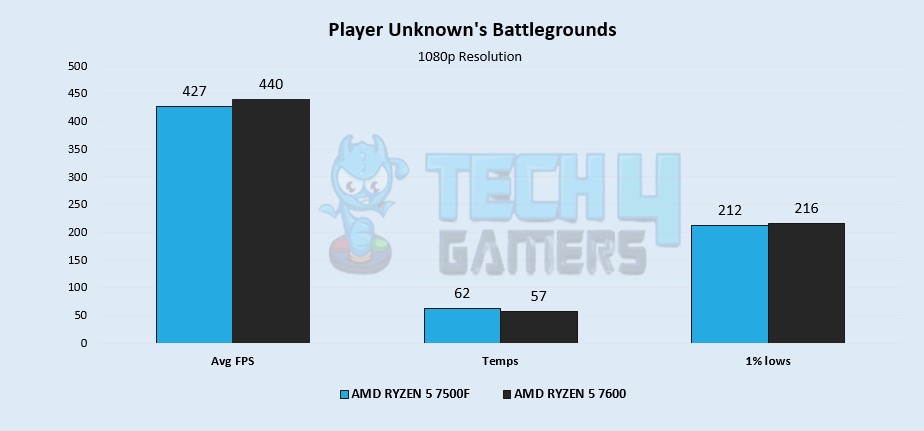
- The Ryzen 5 7600 commands a lead of 2.9% in average FPS, boasting a rate of 440 FPS, while the Ryzen 5 7500F achieves 427 FPS, indicating a discernible performance disparity between the two processors.
- Moreover, the Ryzen 5 7600 showcases its thermal prowess by maintaining an average temperature of 57°C, marking an 8.4% advantage over the Ryzen 5 7500F, which operates at 62°C, resulting in a notable difference in heat management.
- Furthermore, the Ryzen 5 7600 asserts its dominance with an exceptional 10.1% lead in 1% low performance, achieving a score of 216 FPS, while the Ryzen 5 7500F trails slightly behind at 212 FPS, showcasing a notable difference in minimum frame rates.
League Of Legends
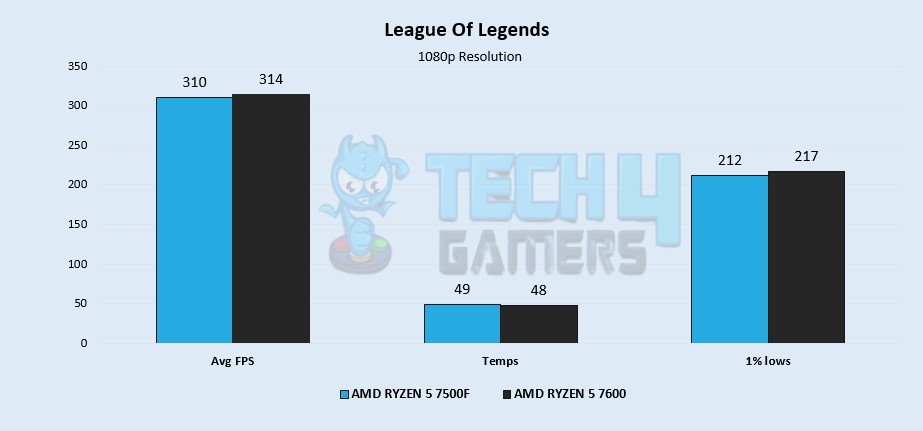
- In the realm of gaming performance, the Ryzen 5 7600 outpaces the Ryzen 5 7500F by a slight margin of 1.2%, with average FPS figures of 314 FPS and 310 FPS, respectively.
- The thermal performance takes the spotlight as the Ryzen 5 7600 operates at an average temperature of 48°C, outclassing the Ryzen 5 7500F’s 49°C by a minor 2%, showcasing its cooling efficiency.
- 1% low performance stands out as the Ryzen 5 7600 takes the lead with a 2.3% advantage, achieving 217 FPS, whereas the Ryzen 5 7500F records 212 FPS, emphasizing its capacity for delivering smoother gameplay experiences.
Overwatch 2
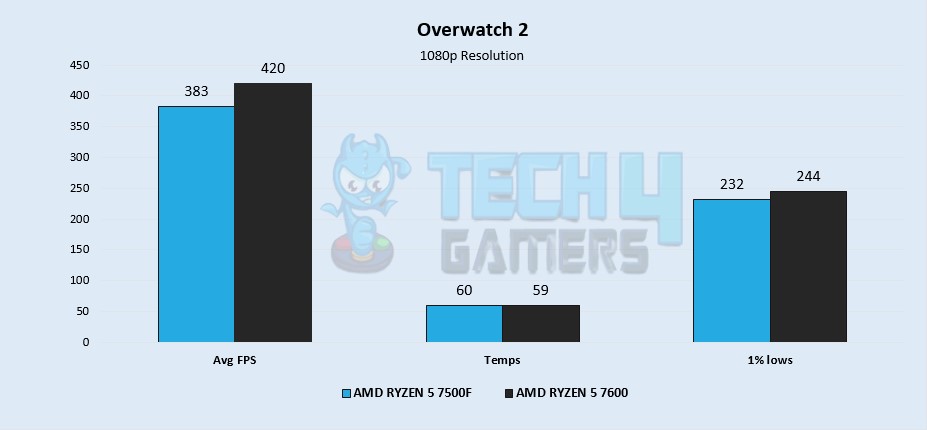
- The Ryzen 5 7600 takes the lead with an impressive 9.2% difference in average FPS, scoring 420 FPS compared to the Ryzen 5 7500F’s 383 FPS, showcasing its superior gaming capabilities.
- In the arena of temperature control, the Ryzen 5 7600 operates at a modest average temperature of 59°C, while the Ryzen 5 7500F registers 60°C, resulting in a slight 1.6% difference between the two processors.
- The Ryzen 5 7600 showcases its prowess in 1% low performance with an advantage of 5%, achieving 244 FPS, while the Ryzen 5 7500F trails at 232 FPS, underlining its capability for maintaining consistent frame rates during demanding gameplay.
Lost Ark
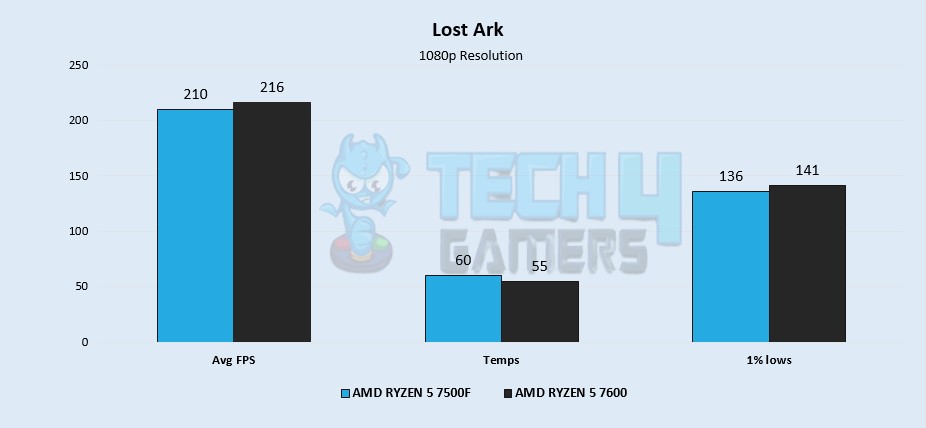
- With an average FPS of 216, the Ryzen 5 7600 exhibits a 2.8% advantage over the Ryzen 5 7500F’s 210 FPS, exemplifying its enhanced performance potential.
- The Ryzen 5 7600 shines in thermal management with an impressive average temperature of 55°C, outperforming the Ryzen 5 7500F by 8.6%, as it maintains a temperature of 60°C during operation.
- Moreover, the Ryzen 5 7600 secures its lead in 1% low performance with a 3.6% advantage, achieving a score of 141 FPS, while the Ryzen 5 7500F registers 136 FPS, highlighting its capacity to maintain smoother and more consistent gaming experiences.
Dota 2
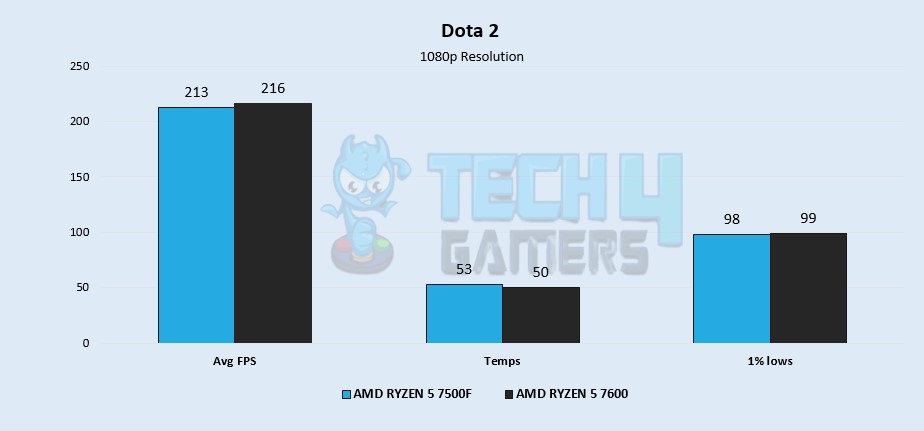
- The Ryzen 5 7600 delivers 216 FPS in average FPS, while the Ryzen 5 7500F comes quite close with 213 FPS, resulting in a mere 1.3% variance between the two processors’ gaming prowess.
- Efficient thermal handling is evident as the Ryzen 5 7600 maintains a cool average temperature of 50°C, showcasing a 5.8% advantage over the Ryzen 5 7500F, which operates at 53°C, underlining its heat management capabilities.
- Exceptional 1% low performance is evident as the Ryzen 5 7600 takes the lead with a slight 1% advantage, achieving 99 FPS, while the Ryzen 5 7500F trails at 98 FPS, indicating its ability to maintain steady and responsive frame rates.
Cyberpunk 2077
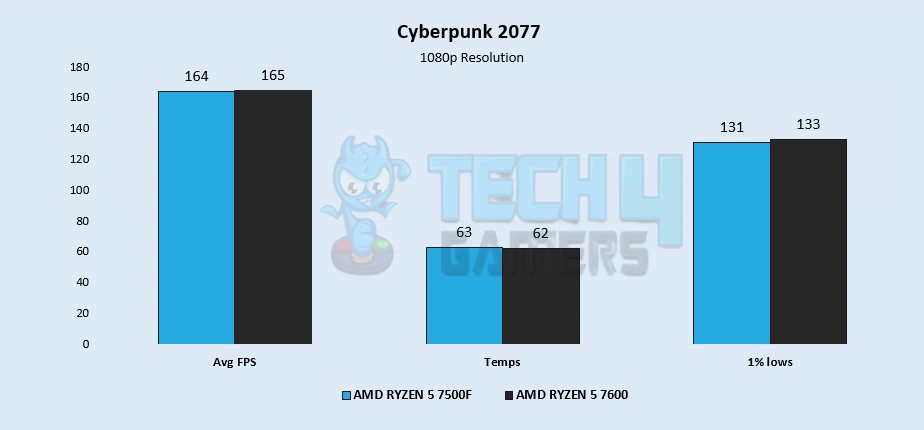
- With a subtle difference of 0.6% in average FPS, the Ryzen 5 7600 slightly outperforms the Ryzen 5 7500F, achieving 165 FPS compared to 164 FPS.
- The Ryzen 5 7600 excels in maintaining temperature as it operates at an average of 62°C, standing a mere 1.6% cooler than the Ryzen 5 7500F, which maintains a temperature of 63°C during operation.
- With a 1.5% lead, the Ryzen 5 7600 showcases its prowess in 1% low performance, achieving 133 FPS, while the Ryzen 5 7500F achieves 131 FPS, underlining its capability to deliver reliable and smooth gaming experiences.
Diablo IV
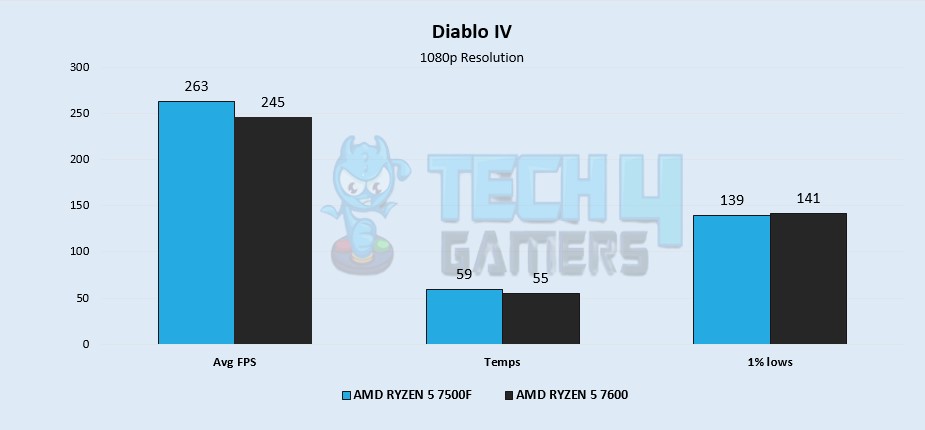
- The Ryzen 5 7600 showcases an average FPS of 245, while the Ryzen 5 7500F flashes ahead with 263 FPS, revealing a noteworthy 7% discrepancy in their gaming performance.
- Thermal prowess is a hallmark of the Ryzen 5 7600, operating at an average temperature of 55°C, outclassing the Ryzen 5 7500F’s 59°C by a significant 7%, highlighting its exceptional heat management efficiency.
- The Ryzen 5 7600 maintains its performance lead with a 1.4% advantage in 1% low performance, achieving a score of 141 FPS, while the Ryzen 5 7500F trails at 139 FPS, demonstrating its capacity for maintaining consistent and responsive frame rates.
Overall Gaming Performance
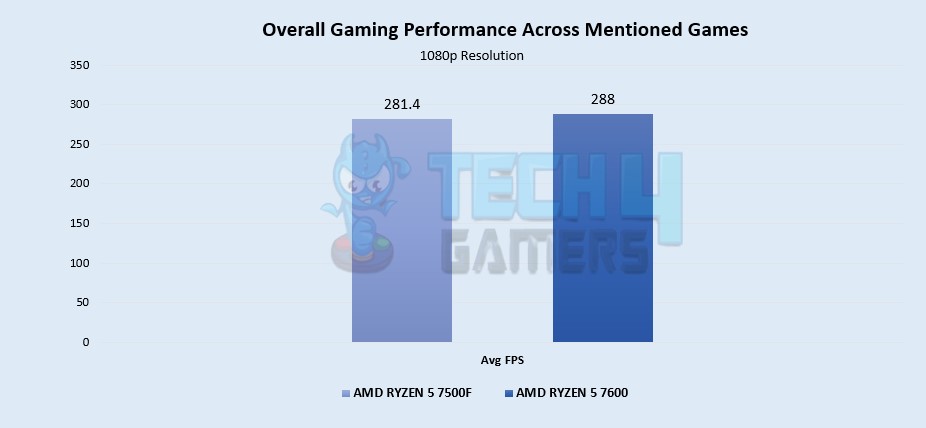
Let’s take a closer look at the average FPS performance of the Ryzen 5 7500F and Ryzen 5 7600 across our range of benchmarked games. This will serve as a foundation for our subsequent breakdown of the benchmark results. By examining their performance side by side, we can discern their strengths and weaknesses and provide a more holistic understanding of their gaming capabilities.
- The Ryzen 5 7600 gains a slight edge with higher average FPS and 1% lows, engaging in a competitive showdown with the Ryzen 5 7500F to deliver enhanced gaming performance.
- With an average FPS of 281.4, the Ryzen 5 7600 presents its gaming prowess, closely compared to the Ryzen 5 7500F’s average FPS of 288, underlining its capability to offer immersive and smooth gameplay experiences.
- Evidencing its gaming superiority, the Ryzen 5 7600 establishes a 2.3% lead over the Ryzen 5 7500F in terms of FPS performance, showcasing its potential to deliver enhanced gaming experiences.
Average Thermal Statistics
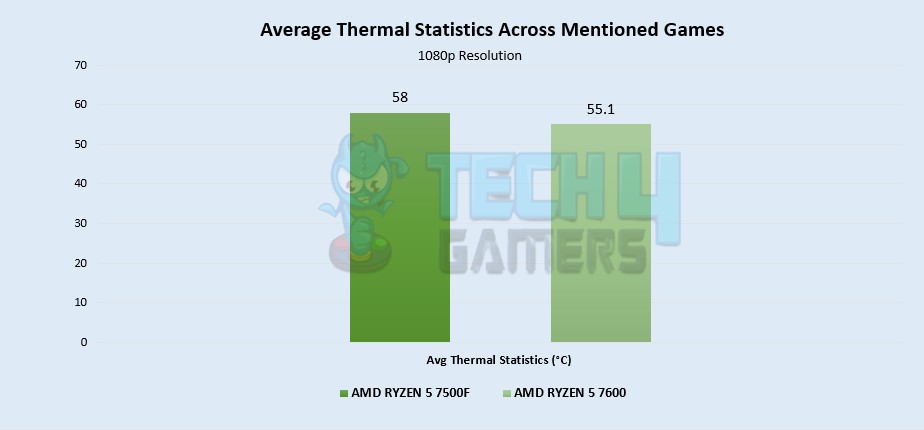
Thermal management is a crucial factor in determining the longevity and stability of processors. In this section, we’ll explore the average thermal statistics of the Ryzen 5 7500F vs Ryzen 5 7600 battle. By analyzing their temperature profiles under various gaming scenarios, we can gain valuable insights into their thermal performance and how well they handle heat dissipation.
- Starting off strong, the Ryzen 5 7600 outperforms the Ryzen 5 7500F in terms of thermal management, ensuring optimal heat dissipation for sustained performance during gaming and demanding tasks.
- Notably, the Ryzen 5 7600 maintains an average temperature of 55.1°C, showcasing efficient heat control, while the Ryzen 5 7500F registers an average temperature of 58°C, emphasizing their thermal handling capabilities.
- Demonstrating its thermal prowess, the Ryzen 5 7600 sets a benchmark by exhibiting a 5% improvement in thermal efficiency compared to the Ryzen 5 7500F, ensuring cooler operating conditions for enhanced system stability.
Pricing And Availability
When considering the financial aspect of these processors, it’s clear that the Ryzen 5 7500F and Ryzen 5 7600 cater to different budget segments. The Ryzen 5 7500F arrives with a competitive MSRP of approximately 179 USD, positioning itself as an appealing option for users seeking solid performance without breaking the bank.
On the other hand, the Ryzen 5 7600 enters the scene with a slightly higher MSRP of 229 USD, reflecting its potentially enhanced capabilities and features. This price difference of 24.5% between the two processors prompts us to delve deeper into their individual performance metrics to understand the value proposition each one offers.
While these suggested retail prices offer an initial impression, it’s important to acknowledge the dynamic nature of the market. Availability, demand, and other market forces can impact the actual pricing of these processors.
Therefore, it’s advisable to consider current market conditions and fluctuations when making purchasing decisions. Our exploration of both processors’ architecture, specifications, and gaming benchmarks will provide a comprehensive perspective to help you evaluate their true worth in relation to their price tags.
Ryzen 5 7600 Vs Ryzen 5 7500F: Which One To Buy?
- In terms of budget-friendly options, the Ryzen 5 7500F holds an edge, being 24.5% cheaper than the Ryzen 5 7600. However, it’s worth noting that this cost savings comes with a slight 2.3% disadvantage in FPS performance, making it a balanced choice for those seeking economical gaming setups.
- Highlighting its thermal advantage, the Ryzen 5 7600 showcases a 5% improvement in temperature control over the Ryzen 5 7500F, ensuring optimal heat dissipation and maintaining stable operating conditions even during intensive tasks.
- While the Ryzen 5 7600 impresses with high FPS performance and thermal efficiency, the Ryzen 5 7500F offers an attractive cost reduction option for users aiming to build a capable system on a tighter budget, making it a versatile choice for different needs.
Pros And Cons
| GPU | Pros | Cons |
|---|---|---|
| AMD Ryzen 5 7500F |
|
|
| AMD Ryzen 5 7600 |
|
|
Thank you! Please share your positive feedback. 🔋
How could we improve this post? Please Help us. 😔
[Comparisons Expert]
Shehryar Khan, a seasoned PC hardware expert, brings over three years of extensive experience and a deep passion for the world of technology. With a love for building PCs and a genuine enthusiasm for exploring the latest advancements in components, his expertise shines through his work and dedication towards this field. Currently, Shehryar is rocking a custom loop setup for his built.
Get In Touch: shehryar@tech4gamers.com


 Threads
Threads![Core i9-12900K vs Ryzen 7-5800X3D [We Tested 11 Games] Intel i9-12900K vs Ryzen 7-5800X3D](https://tech4gamers.com/wp-content/uploads/2022/06/Intel-i9-12900K-vs-Ryzen-7-5800X3D-218x150.jpg)
